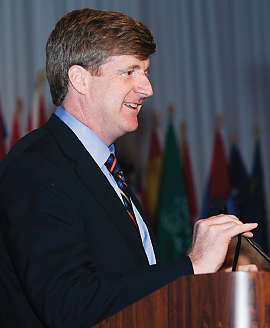Parity Law Celebrates Anniversary

Patrick Kennedy
October 3 marked the fifth anniversary of the passage of the Mental Health Parity and Addiction Equity Act (MHPAEA). The landmark legislation was hailed by APA, other medical groups, and patient advocacy organizations as promising to end discrimination in insurance coverage against those with mental illness. At the time of its passage, APA Director of Government Relations Nicholas Meyers told Psychiatric News, “This is a tremendous victory for the APA leadership and Assembly, our grassroots activists, and all APA members and staff. It is most particularly a victory for patients and their families across the country” (Psychiatric News, October 17, 2008).
But five years later, a final rule from the federal government providing regulatory guidance for enforcement of the law has not been issued, and in the meantime insurance companies have found a variety of ways to circumvent the law.
On the anniversary, former member of Congress Patrick Kennedy, who with his late father, Sen. Edward Kennedy, were prime movers behind the law, issued a statement re-emphasizing the importance of the MHPAEA and calling on the Obama administration to issue the final rule so that those suffering from mental illness and addiction can get health coverage equal to those with other medical illnesses.
“I’m very proud that the law I sponsored with my father is helping tens of millions of Americans who struggle every day with mental illness and addictions and who for years received unequal, inadequate care,” he said. “With health exchanges taking root in all 50 states, we can’t wait another moment for the final rule on this law, which helps to remove the arbitrary distinctions between the brain and the body it resides in when it comes to health care. Providing mental health care equal to health care for the rest of the body not only will improve outcomes, but reduce costs as well. With the Affordable Care Act taking effect, a generation of veterans returning home, many struggling with brain injuries sustained in combat, a suicide epidemic, and far-too-frequent gun violence, we have an urgent need and a tremendous opportunity to finally achieve mental health parity and eliminate the discrimination experienced by people with mental illness.”
To watch a public-service announcement of Patrick Kennedy in APA’s “Mental Health Minute” series, go to APA’s website at http://www.psychiatry.org/mental-health/more-topics/insurance-and-parity. A blog by APA President Jeffrey Lieberman, M.D., and Kennedy on the need for the final rule on parity and enforcement of the law is posted at http://thehill.com/blogs/congress-blog/healthcare/327013-make-good-on-mental-health-parity. ■



